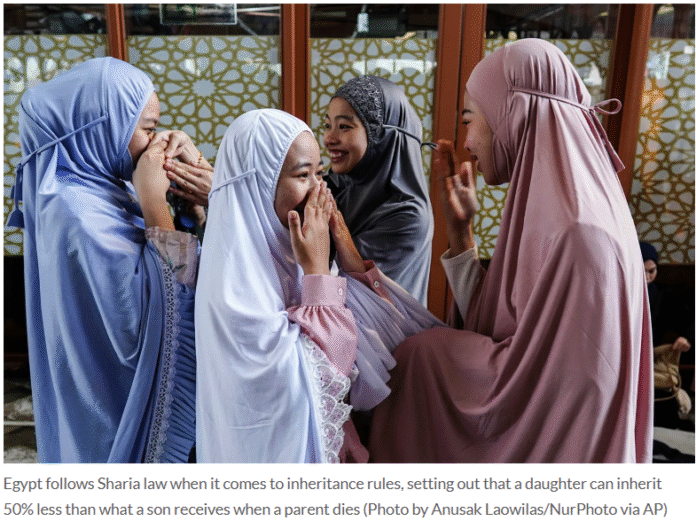Why do men typically receive twice as much inheritance as women in Egypt? Research explains
Dina Rabie’s study into attitudes towards pro-male inheritance stipulations in Sharia law found there to be a bias towards sons receiving more money than daughters.
By Patrick Daly/Northeastern Global News
LONDON — A vast majority of Egyptians surveyed during a study said they supported Islamic-based inheritance rules in which women inherit about half of what men receive.
The research survey conducted by Dina Rabie, an assistant professor in economics at Northeastern University in London, found that 70% of respondents would want a son to inherit twice as much as a daughter in the event of a parent’s death.
The behavioral economist’s paper — “Attitudes towards Islamic inheritance: religious or patriarchal preferences?” — explored whether it is Islamic belief or cultural norms that underpin such attitudes toward gender inequality.
Rabie says the North African nation uses Sharia law — derived from Islam’s holy book, the Quran, and teachings of the Prophet Muhammad — as the basis of its family legislation.
According to Sharia law, a daughter can inherit 50% of what a son receives when a parent dies. If there is no male heir, then the next blood relation of the deceased, such as a brother or sister, would be in line to receive a share of the inheritance along with any daughters.
Rabie explains that in Egypt, a Sunni Muslim-majority country, parents who have no male offspring have been known to hand down assets to their daughters during their lifetime to ensure the wealth remains within the immediate family. They do this using gifts rather than wills, as it is harder to legally challenge, she adds.

During the research, 231 adult Muslims — 83% of whom reported holding non-conservative religious beliefs — took part in an online experiment. A total of 41% of respondents were women and 90% were university educated.
They were asked whether they were for or against hypothetical inheritance situations in which fathers acted in four different ways to ensure their daughters received a larger share of inheritance than they ordinarily would under Sharia law. In two of the scenarios, Islamic law was circumvented altogether; in the other two, it was followed in part.
The results of Rabie’s study, which was co-authored with Nora El Bialy from the University of Hamburg in Germany and published in the Review of Law & Economics, show that even those who did not regard themselves to be conservative Muslims leaned toward wanting to uphold the patriarchal preference in questions of inheritance.
“What I found is that religious people will obey the law no matter what the gender of the offspring was,” says Rabie. “They will be happy with the unequal distribution of inheritance according to Sharia law and they will not alter that view based on the gender of the offspring.
“However, I found that those who have plural cultural beliefs, rather than religiosity, were the ones who entered into a view on whether or not to obey the law based on the gender composition of the offspring. They were more likely to discriminate against the daughter in favor of the son. But in the absence of the son, they were more likely to want the money to remain inside the household.”
In a breakdown of the numbers, 20% of participants were pro-gender equality in the scenarios. Half were in favor of Islamic law being followed regardless of the offspring compositions, and another 20% were deemed to be pro-male in all four situations. One-tenth of those surveyed supported daughters receiving more money than sons.
“When you look at it,” Rabie continues, “we have over 70% who want this distribution that the son gets double over a daughter, while only 10% want the daughter to get more than the son.”
For Rabie, the results make plain how embedded inequality is in Muslim countries when it comes to inheritance.
Along with Saudi Arabia and Iran, Egypt has some of the least gender-equal family laws worldwide due to the strong influence of Sharia in family legislation, according to the paper. Egypt ranks 135th out of 146 countries on the 2024 Global Gender Gap Index.
“I’m trying to draw attention,” says Rabie, “to the fact that gender discrimination, or gender differences, in Egypt and in Muslim countries are deeply rooted.
“They need a comprehensive way of addressing it. No one single legal reform will be effective — it needs more than that. There is a need to slowly change the perception of women as inferior to men, to change this view that they are not the ones worthy of assets.”
Such attitudes are not isolated to only Egypt, Rabie’s paper points out. Studies have shown that gender inequality is more commonplace in countries where religious affiliation in the population is higher than average.
In Kenya and India, when legal reforms created gender equal inheritance rights, Rabie notes that there were cases of parents gifting money to their sons in order to still comply with Sharia law.
Her paper concludes that its survey results “show that the religious values promoted by the Islamic revival in Egypt, as well as the pro-male cultural beliefs, represent obstacles for any legal reform allowing for gender equality in inheritance.”
It adds: “Such pro-male values may result in weak legal enforcement of any potential reform or potentially even blocking such a reform altogether.”
Being deprived of assets early on in their lives affects women’s economic power, Rabie argues. This is exacerbated by the traditional practice in Egypt that parents should, on top of giving them double the inheritance of their sisters, purchase their sons’ first home. The same is not the case for daughters.
“You can see that labor force participation — the jobs women end up with — in Egypt is much worse than for men,” Rabie adds. “But this gender gap will persist as long as there’s a gender gap in asset acquisition like there is at the moment.”













